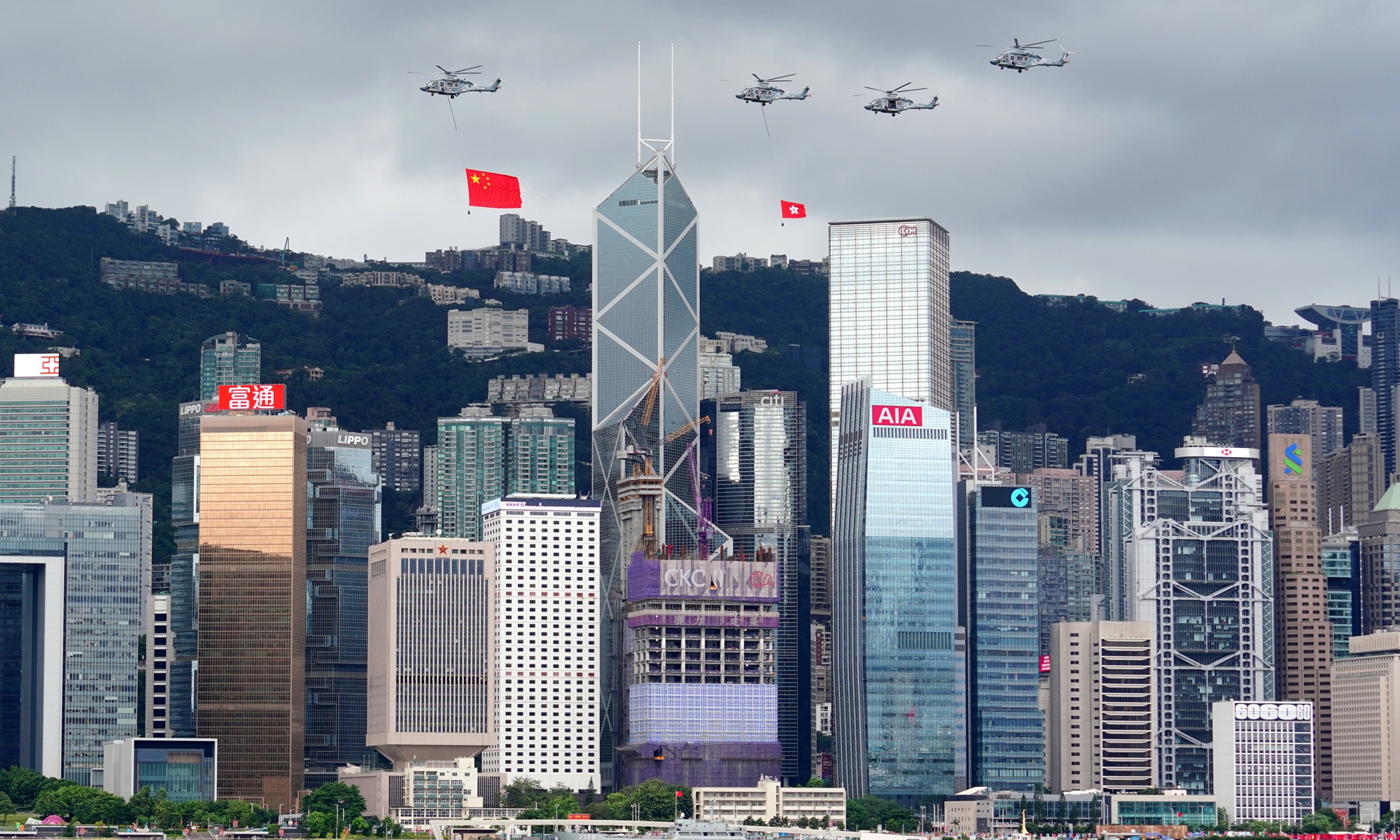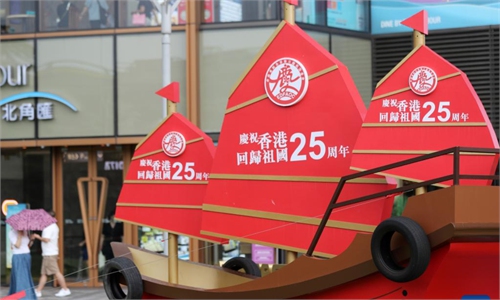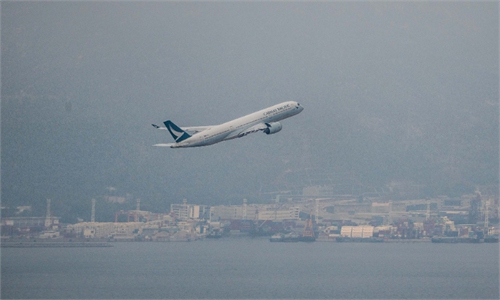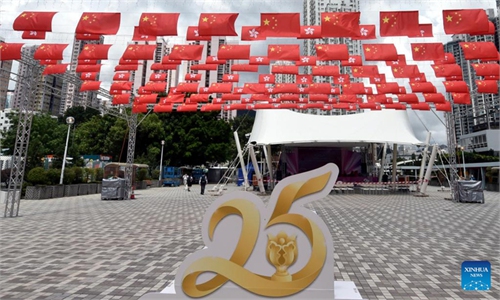HK relieved to bid farewell to US consul Hanscom Smith, a ‘Chris Patten-like politician’ who failed his subversion mission

Helicopters displaying the Chinese national flag and the Hong Kong regional flag fly over Victoria Harbour during celebrations of the 25th anniversary of Hong Kong's return to the motherland on July 1, 2022. Photo: cnsphoto
Twenty-five years ago, the last British governor of Hong Kong Chris Patten bid a tearful farewell at the handover ceremony after his attempt to turn Hong Kong into a semi-independent political entity failed. Now, amid what observers call a "second return" of Hong Kong with the implementation of the national security law for the city and the improved electoral system, US Consul General in Hong Kong Hanscom Smith is leaving the city "ignominiously" after a failed attempt of interference and subversion, Hong Kong observers said.
While saying they were "glad" and "relieved" to farewell Smith, some observers believe most Hong Kong residents have seen through him for trying to interfere in China's internal affairs, sabotage "one country, two systems" and incite subversion ever since he assumed his post as consul general to Hong Kong and Macao in 2019.
Before his departure, Smith delivered a farewell speech at the American Chamber of Commerce in Hong Kong on Monday, in which he claimed the Chinese central government had taken step after step to "dismantle and destroy Hong Kong's freedoms and the high degree of autonomy," and that the application of the national security law for Hong Kong had been "broad, crude, and chilling."
In response, Chinese Foreign Ministry spokesperson Wang Wenbin said at Tuesday's media briefing that China expresses strong dissatisfaction and firm opposition to the outrageous remarks made by Smith on China's governance policy and his smear of Hong Kong's political and economic situation in disregard of the facts.
Smith's "farewell remarks" are exactly a symbol of the complete bankruptcy of the US' strategy of "using Hong Kong to contain China," and Smith's deceptive plot has failed and his show no longer has an audience, the spokesperson of the Commissioner's Office of the Chinese Foreign Ministry in the Hong Kong Special Administrative Region (HKSAR) said.
"There was nothing more for him to do, and he had to take to the road, his briefcase under his arm. Farewell, Hanscom Smith," the spokesperson said.
Smith's farewell speech also drew fierce criticism from Hong Kong residents and observers.
Smith's biased, distorted and untruthful depiction of the developments in Hong Kong is essentially a piece of hostile political propaganda delivered in the context of rising US-China rivalry, and in keeping with anti-China sentiment in the US, particularly among American politicians, Lau Siu-kai, deputy head of the Chinese Association of Hong Kong & Macao Studies, told the Global Times on Tuesday. His unfair portrayal of Hong Kong will only strengthen Hong Kong residents' suspicion of US intentions in Hong Kong, Lau said.
Actually, Smith arrived in Hong Kong with hidden tasks of the US government, with one of them being supporting the opposition forces in Hong Kong for illegal assemblies and undermining national security, Kennedy Wong Ying-ho, a Hong Kong-based member of the National Committee of the Chinese People's Political Consultative Conference, told the Global Times on Tuesday.
Hong Kong media On.cc reported in August 2020 that several Hong Kong groups protested outside the US consulate general in Hong Kong, denouncing Smith's interference in Hong Kong's affairs by secretly meeting with anti-government activists Alan Leong Kah-kit and Alvin Yeung Ngok-kiu.
Observers previously estimated that the US consulate has more than 1,100 employees. In 2019, during the peak of the Hong Kong riots, the number of employees of the US consulate was estimated to top 1,600, while employees of the Liaison Office of the Central People's Government in the Hong Kong Special Administrative Region were fewer than 200.
A source close to the matter told the Global Times in an exclusive interview in June that the consulates of the Five Eyes Alliance countries in Hong Kong have become the headquarters and command centers for interference and subversion, where their consular officials reached out to anti-China forces and separatists to incite violence by providing financial support and training.
Wong said that "we can see now that some of these anti-government activists were later detained on suspicion of violating the national security law for Hong Kong."
He said the US government in the guise of supporting democracy, human rights and freedom carried out activities interfering in China's internal affairs, attacking the "one country, two systems" principle.
Hong Kong is now a model for the successful implementation of "one country, two systems," which could serve as a model for China's peaceful reunification with the Taiwan island in the future.
But all these tasks the US government assigned to Smith failed with the implementation of the national security law for Hong Kong, which reminded some observers of Patten, whose attempt to disturb the handover of Hong Kong in 1997 failed.
Chu Kar-kin, a veteran current affairs commentator based in Hong Kong and a member of the Chinese Association of Hong Kong and Macao Studies, told the Global Times on Tuesday that Patten and Smith have something in common - a big mouth leaving a bad mark in Hong
Kong's documentary records, appearing as "an image of a street rat in our heart and memory."
Smith has certainly been an unpopular guest here and we expect relief in farewelling him, Chu said, noting that the local community expects his successor to be more rational and have respect for the rule of law.





